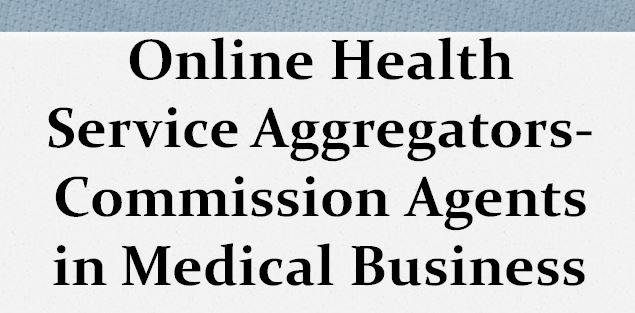India features a mixed-market health system where chronically low investment in public health systems has led to the proliferation of private care providers. In last few years, a bevy of apps and service aggregators have starting operating brazenly in the country, pushing aggressively for tests and surgeries and delivering drugs, often advertised by Superstars and Celebrities. Patient often zigzags between health providers with unclear referral pathways, and ends up receiving questionable quality of care that may typically neither be safe nor affordable.
Online health aggregators are nothing more than sophisticated commission agents. The medical business model thrives on advertisement and commission. Government rules prevent doctors from advertising or soliciting for surgeries, but these companies live on advertising. Any doctor or hospital can get advertised through these companies. In lieu of some money, anyone can be declared as the best and hence misguidance to the patients cannot be ruled out. The flow of patients to a health care facility can be enhanced by financing the advertisements and not by actual quality work and results in increasing medical business manifold. They do not contribute to much needed medical infrastructure and merely redirect patients to existing facilities. They may at the best be able to become facilitators of the process that attract patients by advertisements and result in skyrocketing cost to patients. Any of the Hospitals and doctors can be projected as the best, who tie up with these online aggregators in lieu of some money. Therefore the misguidance as well as increased costs is the two main drawbacks of such a lucrative arrangement of this new medical business. They charge hospitals and doctors for advertisements ( sending more patients) and patients for channelizing them. In the resulting Zig-Zag path, patients are treated more on the basis of advertisements that are many times aired by our ‘Filmy Superstars’.
The health service aggregators have no skin in the game. Neither do they invest in hospitals nor do they have the responsibility of running a hospital, but they want the money which a patient will spend on their health in a hospital. They have conveniently created online apps and are ranked top on search websites. This whole process is against the values and ethics, which healthcare delivery is supposed to be.
Unregulated operations by unscrupulous online health service aggregators pose grave risk to public health.
The damage caused by the unchecked presence of health service aggregators online is snowballing into a major healthcare crisis which the Union and state governments can ill afford to ignore. Instead of becoming a part of the solution, they have added to the problem by pushing aggressively for tests, surgeries and healthcare services without any medical requirement or prescription.
There are plenty of such apps which advertise about doctor consultations, quick surgeries and direct-to-consumer laboratory tests.
This is where the trouble begins.
In one case, the healthcare aggregator suggested surgery for constipation. The mention of surgery scared the patient, who then approached a hospital where they advised him to improve his diet.
For a kidney stone issue, a healthcare aggregator suggested a laser surgery to a patient without consulting a urologist. The laser surgery was done and the stones got stuck in his pelvi-uretery junction of the kidney-uretery track. He became aware of it two weeks later when he had severe pain in his flank, because of which he walked in to a hospital after the app refused to acknowledge his concerns.
In all of these cases, the apps charged almost double the existing rates for surgeries. For a piles operation, in a general ward, a hospital charges between Rs 50,000-70,000, inclusive of medicines in a patient without co-morbidities. The apps charged between 1.25 lakh to 1.5 lakh, while the national public health insurance scheme Ayushman Bharat rates for such surgeries begin at Rs 10,000.
Ads are being run by online health service aggregators in newspapers and all kind of media.
For removal of kidney stones, hospitals charge Rs 50,000, while the apps charge upwards of Rs 1 lakh, while on the government’s Ayushman Bharat scheme, it is Rs 33,000.
Circumcision is priced at Rs 60,000 by the healthcare aggregators, when hospitals charge Rs 10,000 for a surgery such as this and it is Rs 3,000 for those availing it using Ayushman Bharat.
Their modus operandi? The healthcare aggregators have tie-ups with certain departments in certain hospitals, where after the app does the diagnosis, a doctor on their payroll is sent to the hospital to perform the surgery. After the surgery, the doctor walks away without any care and the patient is left at the hospital until he gains consciousness. At which point, if there is any immediate post-operative care, the nurse concerned does it based on the instructions of the doctor who left. Then the patient checks out.
A fee is paid by these healthcare aggregators to these hospitals for use of the premises for the surgery. In most cases, they approach smaller hospitals where either the top administration turns a blind eye towards these activities. Sometimes, the doctor who performed the surgery may not be on their rolls, but that from a healthcare aggregator.
“The health service aggregators have no skin in the game. Neither do they invest in hospitals nor do they have the responsibility of running a hospital, but they want the money which a patient will spend on their health in a hospital. They have conveniently created online apps and are ranked top on search websites. This whole process is against what healthcare delivery is supposed to be,” said Dr Jagadish Hiremath, CEO of ACE Suhas Hospital in Bengaluru.
Government rules prevent hospitals from advertising or soliciting for surgeries, pointed out Hiremath, but these companies live on advertising.
Such health care aggregators are feeding off hospitals and they need to be regulated. “If you remove the advertisements, these companies don’t exist. They have no physical presence except for a few labs or clinics,” he added.
“The problem is getting compounded by these discounts and offers for unnecessary medically and unwarranted testing in the name of wellness/immunity packages. It is a price war to offer maximum number of tests at lowest prices which is totally meaningless,” highlighted Malini Aisola, co-convenor of All India Drug Action Network (AIDAN)
These online health service aggregators have added to issue of illegal pathology laboratories mushrooming all over, pointed out Dr Jagadish Keskar of the Maharashtra Association of Pathologists and Microbiologists
Almost all of them have roped in big names as brand ambassadors – actor Hrithik Roshan, Amitabh Bachchan, singer Guru Randhawa, Rahul Dravid, actor Sonu Sood, actor Rajat Kapoor, Neha Dhupia, Yuvraj Singh and Randeep Hooda to talk about specific health issues and MS Dhoni.
“They have all these famous names as brand ambassadors as if they will perform the surgeries or look at your blood in a lab. This confuses the public, who are already bombarded with too much information,” quipped Hiremath.
Consumer Drug Advocacy group All India Drug Action Network (AIDAN) argued that the direct-to-consumer advertising has to stop completely. “It is too dangerous in healthcare. Aggregators are inducing demand when people are at their most vulnerable due to the pandemic. They are pushing promotions and offers on tests and surgeries and healthcare services without medical assessment or prescription,” said Aisola.
There is a danger particularly with surgeries, contended Aisola, because this could lead to bypassing medical opinions and identifying alternative treatments. When doctors, hospitals and labs associate themselves with the aggregators, there are ethical issues too, she pointed out.
The practice of doctors associating themselves with these healthcare aggregators have alarmed several doctors’ associations. Association of Minimal Access Surgeons of India (AMASI) wrote to its members stating that any member who has made such a contract with healthcare aggregators should disengage immediately failing which a member found to be in contract thereafter may be liable for disciplinary action by regulatory authorities.
They warned that any litigation arising from such practices will not be defended by the association during legal process by way of expert opinion or otherwise.
“It jeopardizes adequate clinical judgment by a trained person regarding need for surgery and decision as to the type of surgery that would be optimum for the particular patient. The apps are made for the sole purpose of making money,” said the AMASI notification.
Advantages-Disadvantage of being a doctor
25 factors- why health care is expensive
21 occupational risks to doctors and nurses
Covid paradox: salary cut for doctors other paid at home



Yes , but online services are not the only ones which have positioned themselves between the patient and the doctor. I view the MBAs , the marketing departments of corporate hospitals, the insurance companies and the TPAs , all have a game to play on a field that is supposedly too small for even the two basic parties. In our country, where the payments for hospitals are a fraction of what our counterparts in the west get , and there is a further squeeze by the above named agencies, ultimately it is the profession that stands to lose. And in a big way. The third parties , by whatever name called , have only to earn. No responsibility, no risk , zero investment. It would be interesting to work out the pay packages of doctors vs marketing people in a hospital. And humiliating too.
And for the ethics , I think a skeleton still remains to haunt us. While all hell breaks loose on us , the Babas are at liberty to advertise their fake medicines citing ‘ research and evidence based therapy ‘. What a travesty!!
LikeLiked by 1 person
Dr Sandeep you are absolutely correct. But the ultimate sufferer are the patients, unable to realize their loss.
LikeLike